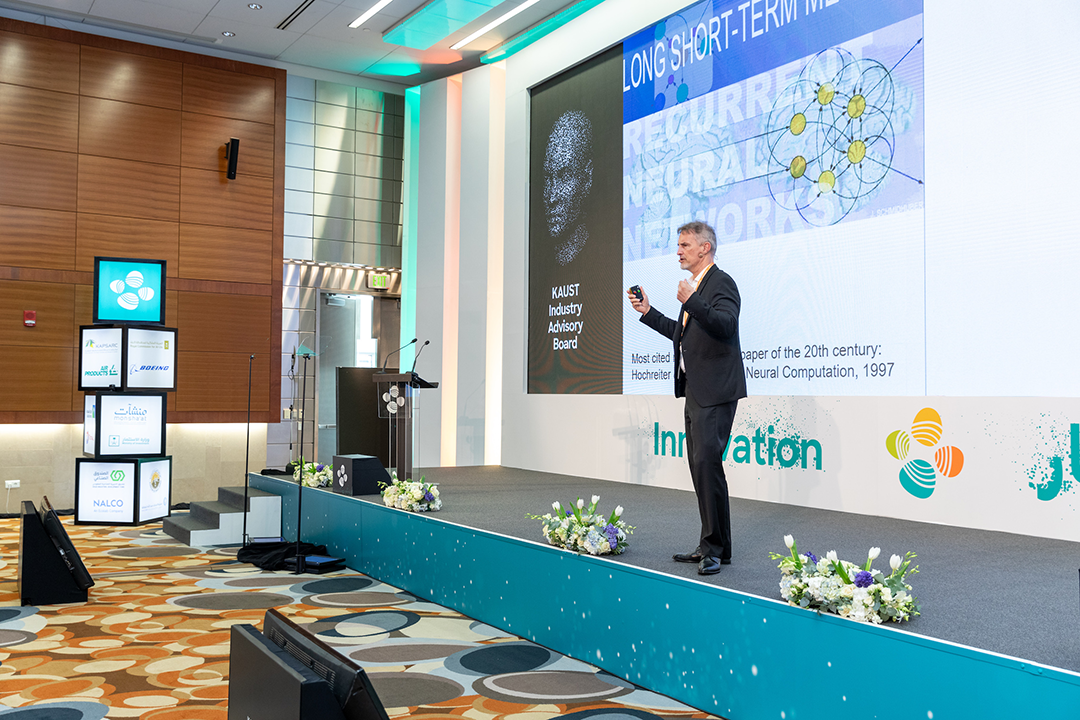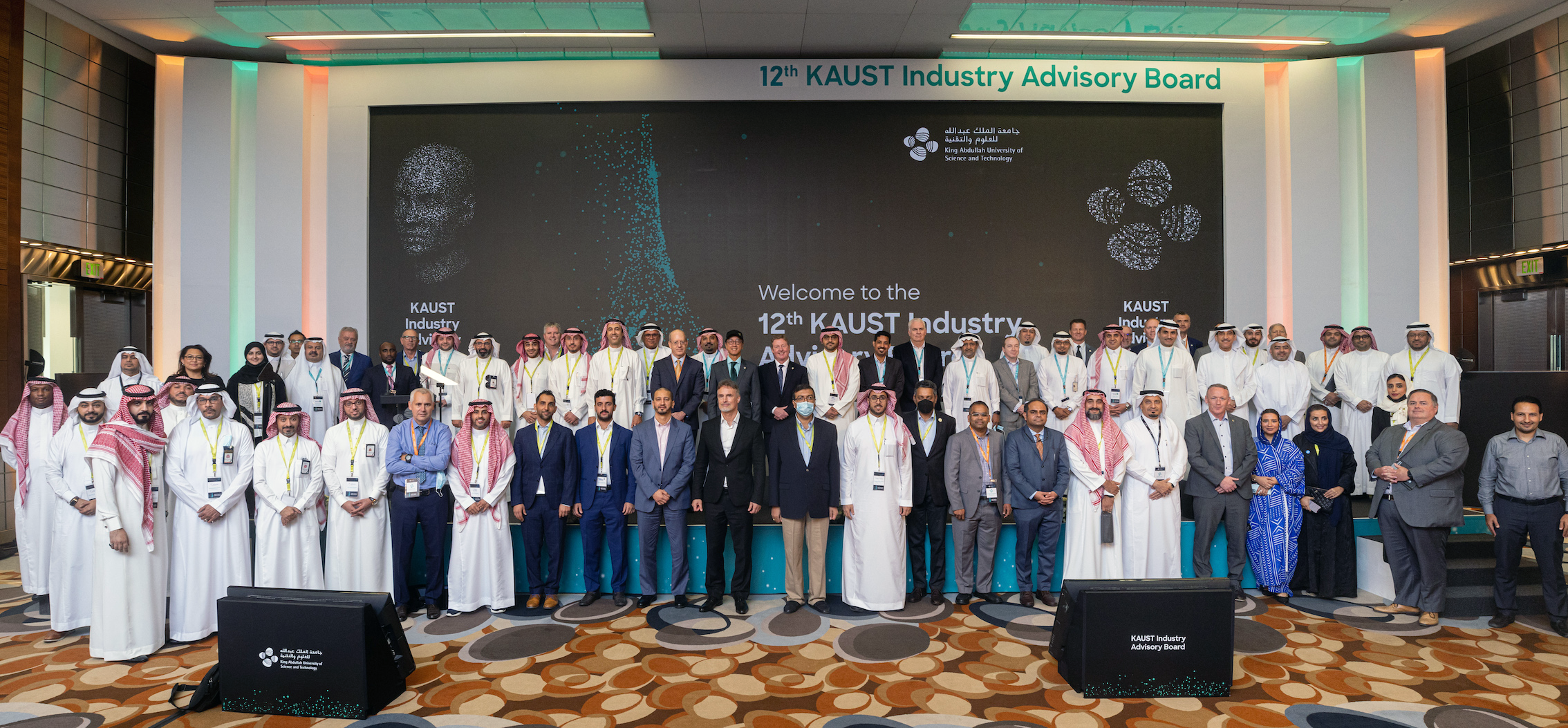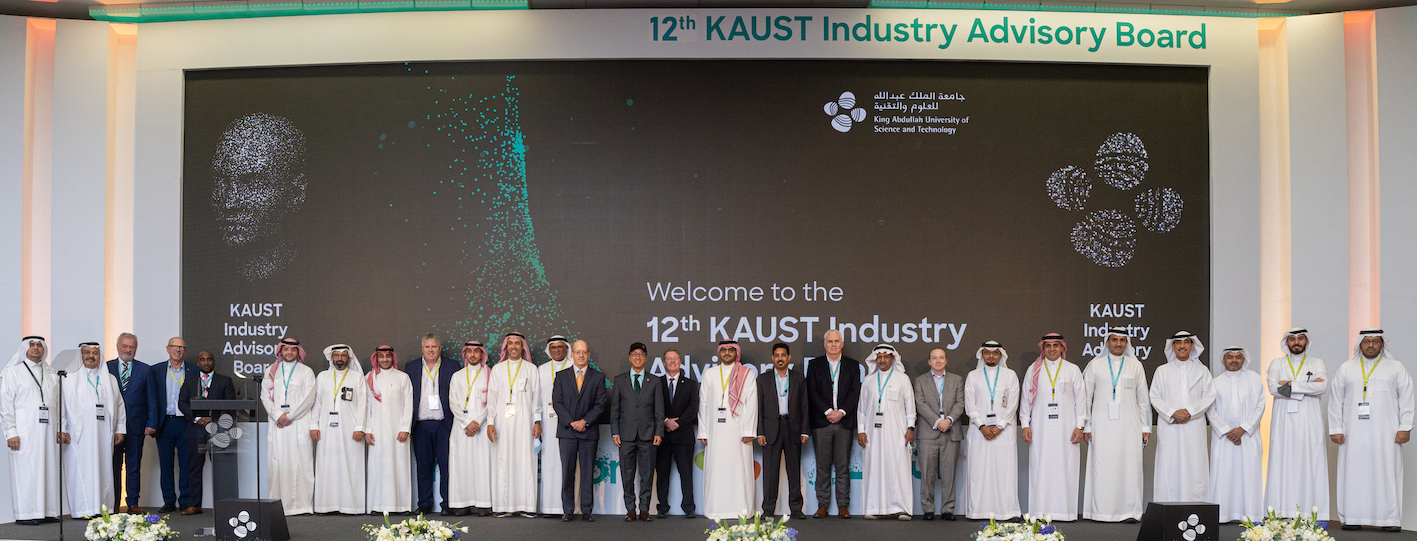KAUST welcomed three new industry partners

KAUST Professor Jürgen Schmidhuber on stage at the 12th annual Industry Advisory Board event
KAUST welcomes NIDLP, Monsha'at and Royal Commission Al Ula to Industry Collaboration Program
King Abdullah University of Science and Technology (KAUST) welcomed three new industry partners at the 12th annual meeting of the KAUST Industry Advisory Board (KIAB). The hybrid event took place November 10 - 11, 2021 highlighting research opportunities between KAUST and their national and global industry partners with a focus on artificial intelligence (AI). During the event, KAUST also renewed its Master Research Agreement with Boeing.
The new members joining the KAUST Industry Collaboration Program (KICP) are
Monsha'at, the
National Industrial Development and Logistics Program (NIDLP), and the Royal Commission of Al Ula. They now make up 25 members of KICP. Developed in 2009, KICP helps companies leverage KAUST's vast resources to transform their needs into opportunities as they innovate the products, processes, and technologies of the future. Through research and development opportunities with KAUST, members can take advantage of KAUST's faculty, world-class talent pool, and technology commercialization capability.

Attendees at the 12th annual KAUST Industry Advisory Board event
Over the past 12 years, KICP members have funded more than 180 research projects with KAUST. These projects focus on solving pressing issues such as energy, water, the environment and food, and more recent initiatives in AI, smart-health and impact-focused translational research. The annual Advisory Board meeting provides members with opportunities for business engagement, research commercialization and economic development.
"Our industry partners play a key role in advancing and translating KAUST's research activities for the world. Each year, this annual meeting helps us keep our finger on the pulse of what is relevant from the industry's perspective, as we likewise provide our partners better appreciation of what KAUST has to offer," said KAUST President Tony Chan. "We welcome our new partners, Monsha'at, the Royal Commission for Al Ula and NIDLP, and look forward to tackling research and technology challenges with them collaboratively."
This year, the focus of the annual KAUST Industry Board meeting is on AI's digital transformation of health, society, and the economy. Investment in AI can be seen across a wide range of products and services in Saudi Arabia, including consumer, enterprise and government activities including smart cities and is a core part of advancing the Kingdom's Vision 2030 objectives.

Attendees at the 12th annual KAUST Industry Advisory Board event
KAUST recently established the AI Initiative which brings faculty together on a range of interdisciplinary AI projects in areas of science and engineering, bioinformatics, smart health, robotics and visual computing. The 2021 KIAB meeting explored these opportunities with their members while keynote speakers from SDAIA, NIDLP, and SWCC presented key AI, machine learning (ML) and big data opportunities for Saudi Arabia. KAUST faculty also presented, highlighting the intersection of AI and digital technologies in KAUST's core research areas.
Additionally, KAUST and Boeing, a member of the KICP program since 2009, have renewed their Master Research Agreement in order to explore areas of research collaboration with regard to AI and ML. Boeing supported academics at KAUST on past R&D initiatives. In 2014, Boeing opened R&D office at KAUST to facilitate research partnership and support KAUST strategic AI initiative. Additionally, Boeing Research & Technology (BR&T) has collaborated with KAUST on a number of major research projects in advanced materials, combustion, solar power and industrial water treatment.
"We are proud of our partnership with KAUST as it is becoming a world-class institution. Our goal is to facilitate both local and international industrial collaborations while working with faculty, researchers, and students at the university," said Ahmed Jazzar, president of Boeing Saudi Arabia.
"Our collaboration with KAUST is designed to inspire and cultivate a research environment for advancing Artificial Intelligence research, which is critical for our global technologically advanced future." Director of Boeing Research and Technology Middle East, Juan C. Campbell, said: "Our office in KAUST is a hub where we can collaborate with research partners and leverage KAUST research and innovation ecosystem."
Other members of the KICP program include: IBM, Halliburton, Lockheed Martin, and Schlumberger to name a few. More than 25% of KAUST graduates are hired by KICP members.
NIDLP and Monsha'at are welcome additions to the program. Earlier this year, KAUST and NIDLP announced a collaboration to develop a capability center for the Fourth Industrial Revolution (4IR). Monsha'at and KAUST have a long-standing relationship supporting the Kingdom's growing SME and startup community. Both will benefit from the working relationship between KICP members and KAUST to crystallize the goals of innovation, advancement and continuing economic development.
"NIDLP, a vision 2030 realization program, aims to transform the Kingdom into an industrial powerhouse and a logistical hub by 2030 and KAUST is a strategic partner in that journey, dedicating its applied research, technological advancements and its capability-building expertise to enable NIDLP's main sectors of energy, mining, industry and logistics," said Eng. Sulaiman Al-Mazroui, CEO of NIDLP.
KAUST is committed to bridging the gap between academic research and industry. As an institution of enterprise, the university is building a deep tech ecosystem that links science and research to economic development. By forming partnerships allowing for access to the university's resources, KAUST is helping to usher in Saudi Arabia's transformation to a knowledge-based economy while solving global issues such as climate, health, and sustainability to benefit the rest of the world.

